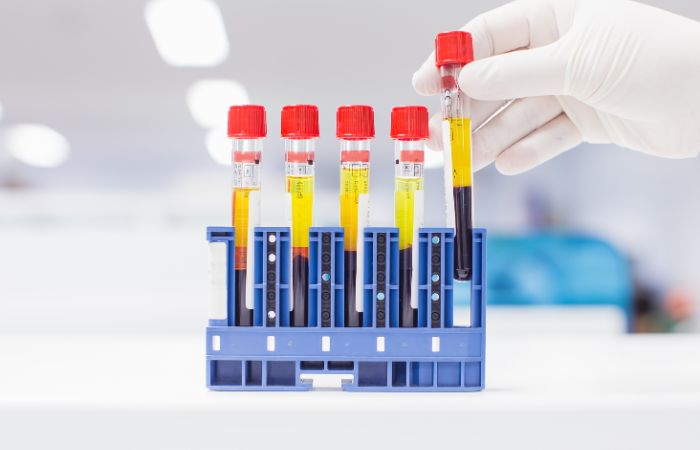
Chickenpox is a common viral infection that primarily affects children. It causes an itchy rash, fever, and general discomfort. While the condition is usually mild, proper care is essential to ensure a smooth recovery and prevent complications. If you suspect your child has chickenpox, a Chicken Pox Blood Test can help confirm the diagnosis.
Chickenpox is caused by the varicella-zoster virus (VZV) and spreads easily through coughing, sneezing, or direct contact with the rash. The infection typically lasts 7–10 days, and common symptoms include:
A] Red, itchy blisters that appear all over the body
B] Fever and fatigue
C] Loss of appetite
D] Headache and body aches
If you notice these symptoms in your child, consider a Chicken Pox Blood Test at a reliable pathology lab for blood test to confirm the diagnosis.
While chickenpox usually resolves on its own, parents can take several steps to relieve discomfort and prevent complications.
A] Relieving Itching and Skin Irritation
Itchy blisters are one of the most uncomfortable aspects of chickenpox. Here’s how you can soothe your child’s skin:
a) Oatmeal Baths – Add finely ground oatmeal to lukewarm water for a soothing bath.
b) Calamine Lotion – Apply a thin layer to itchy spots to reduce irritation.
c) Cold Compress – Use a cool, damp cloth on itchy areas to provide relief.
d) Loose Clothing – Dress your child in soft, breathable fabrics to prevent further irritation.
B] Managing Fever and Pain
Children with chickenpox may experience mild fever and body aches. To keep them comfortable:
a) Give Acetaminophen (Paracetamol) – Helps reduce fever and discomfort. Avoid aspirin, as it can lead to serious complications.
b) Encourage Rest – Plenty of sleep helps the immune system fight the infection.
c) Keep Them Hydrated – Offer water, fresh juices, or electrolyte drinks to prevent dehydration.
C] Preventing Scratching
Scratching the blisters can lead to scarring and secondary infections. To minimize scratching:
a) Trim Your Child’s Nails – Short nails prevent deep scratches that can cause infections.
b) Use Mittens or Gloves – For younger children, covering their hands at night can prevent scratching in their sleep.
c) Distract with Activities – Engage your child in calm activities like drawing, storytelling, or puzzles.

While most cases of chickenpox are mild, some children may develop complications that require medical attention. Contact a doctor if your child:
A] Has a persistent high fever (above 102°F)
B] Develops pus-filled, painful blisters
C] Shows signs of dehydration (dry mouth, no tears, fewer wet diapers)
D] Experiences breathing difficulties or confusion
If you need to confirm the diagnosis, look for a near me pathology lab that offers a pathology lab test in Pune to get accurate test results.
A Chicken Pox Blood Test helps confirm the presence of the varicella-zoster virus. This test may be necessary if:
A] Your child’s symptoms are unclear or resemble other skin conditions.
B] The doctor wants to check the immunity status.
C] There is a risk of complications due to a weakened immune system.
You can find a pathology lab for blood test that provides reliable and quick testing to assist in diagnosis.
Since chickenpox is highly contagious, take these precautions to prevent spreading the virus:
A] Keep Your Child at Home – Avoid school, daycare, and social gatherings until all blisters have crusted over.
B] Practice Good Hygiene – Wash hands frequently and disinfect commonly touched surfaces.
C] Limit Contact with High-Risk Individuals – Keep your child away from newborns, pregnant women, and individuals with weakened immune systems.
Once a child recovers from chickenpox, they usually develop lifelong immunity. However, the virus remains dormant in the body and may reactivate later in life as shingles (herpes zoster). To prevent future complications:
A] Consider the Chickenpox Vaccine – The varicella vaccine can prevent the infection or reduce its severity if given early.
B] Maintain a Healthy Immune System – A well-balanced diet, regular exercise, and good hygiene practices can help protect against infections.
If you need a Chicken Pox Blood Test, it’s important to choose a reputable pathology lab for blood test. You can easily find a pathology lab test in Pune that offers quick and accurate results, helping your doctor determine the best course of action.
A] Search online for “near me pathology lab” to find trusted labs in your area.
B] Look for reviews and ratings to ensure accurate testing and good service.
C] Choose labs that follow safety and hygiene protocols for reliable results.
Caring for a child with chickenpox requires patience, comfort measures, and proper monitoring. While the condition is usually mild, parents should take steps to ease discomfort, prevent scratching, and watch for complications. If you need to confirm the diagnosis, getting a Chicken Pox Blood Test at a near me pathology lab or a pathology lab test in Pune is the best way to ensure accurate results.
With the right care, your child will recover quickly and be back to their happy, playful self in no time!